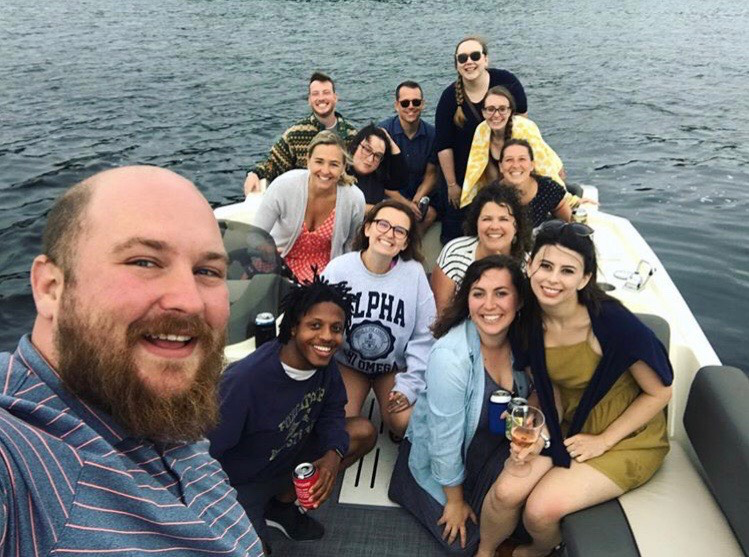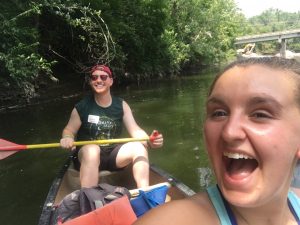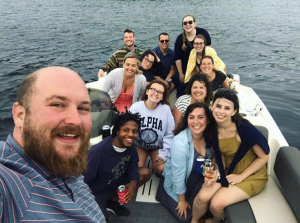As the summer internship comes to a close, I want to reflect on the experience I had at Indiana Humanities, a statewide non-profit that encourages Hoosiers to think, read, and talk. Over the past couple of weeks, I was fortunate to work big events and go to places that no other internship can offer.
The Next Indiana Campfires Series is a program unique to Indiana Humanities. This program combines treks into nature with literature and campfire discussions. The series won the Helen and Martin Schwartz Prize for Public Humanities Program in 2017, a national award given to the best humanities program in the nation. I was able to take a canoe trip down the White River while engaging in a conversation about literature. My co-intern, Julia, and I shared a canoe for the trip, and it was a bonding experience. I never thought that a four-hour canoe trip would change a relationship, but let me tell you, it definitely does.
One experience that specifically that brought us closer was having to work together when we got stuck between a couple logs and stopped moving. The river was very low, so not only were we stuck, but the boat kept dragging across the bottom of the river, making it hard to paddle out. Of course, with our luck, at the same time, it started to pour. At that point, we both looked at each other, decided to take a breath, and worked on getting out of the mess we were in. A few minutes later we were able to get free. About a half mile down the river we met up with the rest of the participants who were on a sandbank under trees trying to stay dry. Soaked through, we paddled up and joined them until the rain stopped.
As part of the program, participants gather to discuss the connections between nature, literature, and place. Kevin McKelvey, a University of Indianapolis professor, led our discussion. He read poems, short stories, and excerpts about nature in Indiana, and asked us to reflect on what we thought of the readings. Many points were brought up about how the White River is impacted by the current political climate both in the state and in the nation. Not only was it a wonderful (and wet) experience, I learned a lot about the White River and how the environment around the river impacts so many people.
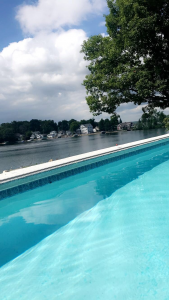
The lake house pool with Hamilton lake behind it.
With Indiana Humanities, I was able to participate in the staff retreat. We stayed at the President/CEO’s lake house on Hamilton Lake in Hamilton, Indiana. During the three-day retreat, the staff discussed the successes and improvements of the current theme, Quantum Leap, which connects the STEM (science, technology, engineering, mathematics) field to the humanities; the next theme and its programming; grant application changes; the strategic plan for the next couple of years; and a discussion on the book titled The Immortal Life of Henrietta Lacks written by Rebecca Skloot.
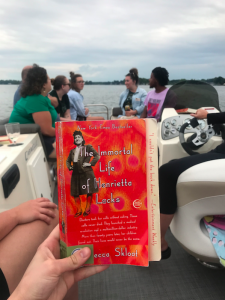
The Indiana Humanities staff during the book discussion.
I found that the discussion of the book was one of the more entertaining parts of the weekend because we engaged in a deep, thoughtful conversation. The Immortal Life of Henrietta Lacks is about Henrietta’s cancer diagnosis and how her stolen immortal cells, now referred to as HeLa cells, helped start a scientific and medicinal discovery period. Taken without Henrietta’s consent, her cancerous cells were used for testing that led to discoveries in polio vaccines and how many chromosomes people have. It also helped scientists learn more about the AIDS virus and leukemia. The book follows the Lacks family – how they struggled to overcome poverty, to accept the fact that Henrietta’s cells have outlived Henrietta, and how the family has not been compensated for the advancements her cells have brought to the field of medicine. We engaged in conversation about whether life can, or should, have a patent on it, if the Lacks family should be paid, and if Skloot was using her white privilege to share this story of the Lacks family.
The staff retreat offered me the opportunity to get to know my coworkers outside of the workplace. We played Mafia (the card game) and hung out by the pool. We went paddleboarding and kayaking out on the lake. It was nice to be away from downtown Indianapolis and enjoy time together on a boat just to hang out.
I only have one week left here at Indiana Humanities, and I’m going to make the most of it. The connections I have made with the staff and other interns are strong and I know that I will be in contact with them as I grow in my profession. Thank you, Indiana Humanities, for the wonderful summer that I have experienced here.
